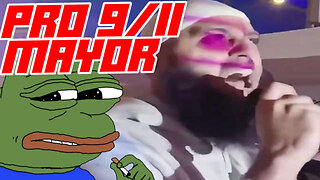Premium Only Content

The Hams Justifies the Means
Inspired from the reading of George Orwell’s “Animal Farm” and Machiavelli’s political treatise “The Prince.” The sketch is an encounter between Napoleon the Pig from George Orwell's "Animal Farm" and Niccolo Machiavelli in his shop “Machiavelli’s Ulterior Design.” The portrait of Machiavelli was painted by Santi di Tito (1536-1603).
Incidentally, contrary to popular belief, Machiavelli never wrote the phrase “The ends justify the means.” According to “An Essay on Machiavelli” (from the “The Portable Machiavelli,” ed. by Peter Bondanella and Mark Musa, 1979), the statement is a gross misinterpretation of a statement from Chapter 18 of “The Prince” where Machiavelli says “in the actions of all men, and especially of princes, where there is no impartial arbiter, one must consider the final result.” As Bondarella and Musa argue “…to consider or examine political goals is a far cry from justifying any political action so long as it purports to lead to a desired goal…Machiavelli never justified all political means by reference to any political ends, and he never completely separated politics from morality, as so many scholars have argued. This is evident from an important but infrequently cited remark Machiavelli makes in reference to Agathocles, the tyrant of Syracuse, in The Prince (VIII): ‘Still it cannot be called skill [virtù] to kill one’s fellow citizens, to betray friends, to be without faith, without mercy, without religion; by these means one can acquire power but not glory”” (p.21-22).
As Machiavelli argues in “Discourses” with the murder of Remus by his brother Romulus, the founder of the Roman republic, sometimes it is necessary to commit a violent act if it is for the public good vice a private agenda (“…for one should reproach a man who is violent in order to destroy, not one who is violent in order to mend things (I, ix),.”).
Napoleon: “Good morning, Nick. My name is Napoleon the Pig and I’m from Manor Farm in Willingdon, England.” – Refers to Napoleon the Pig from “Animal Farm.” George Orwell modeled Napoleon after Joseph Stalin. It’s rather appropriate that in this sketch Napoleon consulted Machiavelli, since Stalin not only allegedly had an annotated copy of “The Prince,” but he lived the life of a Prince as well (literally and figuratively speaking). Stalin is widely regarded as the epitome of Machiavelli’s Prince.
Machiavelli: “By any chance are you related to Napoleon Bonaparte, the Emperor of The French, King of Italy, and Protector of the Confederation of the Rhine? He’s one of my best customers.”
Napoleon: “Nyet, sorry, never heard of him.” - According to Bondanella and Musa (1979), Machiavelli’s “The Art of War” was read and admired by great military thinkers such as Napoleon Bonaparte (1769-1821), Frederick the Great (1712-1786) and Carl von Clausewitz (1780-1831). Carl von Clausewitz was a Prussian general and military theorist.
Napoleon: “Then, in an effort to deify me and my absolute rule over the farm, I will erase all the commandments and replace them with the phrase, 'All animals are equal, but some animals are more equal than others'' and the maxim 'Four legs good, two legs better.' Then as a final condemnation of memory, I will change the farm’s anthem to one extolling me and replace the Hoof and Horn flag with one of Muammar Gaddafi's old flags that I picked up at a rummage sale in Tripoli.” - At the end of the book, the Animal Farm’s green flag with a white hoof and horn was changed. The hoof and horn were removed, leaving just a solid green flag. Libya had a solid green flag from 1977-2011.
Machiavelli: “Well, like you said, you want to gradually undermine Snowball’s leadership so as to avoid being rooted out, pardon the pun.” –Referring to “rooting.” Rooting is when a pig uses his or her nose to dig up and find grubs and other treats out of the ground.
References:
Machiavelli, N. (1979). The Portable Machiavelli. Ed by Peter Bondanella and Mark Musa. Penguin Books. First published in 1532.
Orwell, G. (1946). Animal Farm.
Sobowale, I. (15 January 2020). Machiavelli and ‘The Prince’: Why Was it ‘Safer to be Feared than Loved’?. Historyhit.com. https://www.historyhit.com/politics-and-florence/
Wikipedia. Sandi di Tito. https://en.wikipedia.org/wiki/Santi_di_Tito
-
 1:10:27
1:10:27
Chad Prather
17 hours agoThe Secret To Pleasing The Lord Over Man!
55.1K47 -
 LIVE
LIVE
LFA TV
12 hours agoLIVE & BREAKING NEWS! | THURSDAY 11/6/25
4,059 watching -
 52:16
52:16
American Thought Leaders
19 hours agoIs There a Link Between Mass Shootings and SSRIs?
46.6K57 -
 17:12
17:12
World2Briggs
20 hours ago $0.07 earnedTop 10 Towns You Can Retire or Live on $1900 a month in the Midwest #1
33.2K25 -
 17:25
17:25
BlackDiamondGunsandGear
1 day agoCustom Building the Cheapest MP5
41.1K2 -
 2:07:20
2:07:20
BEK TV
1 day agoTrent Loos in the Morning - 11/06/2025
39.4K1 -
 8:10
8:10
The Shannon Joy Show
20 hours agoShould we even VOTE anymore?
38.2K48 -
 59:34
59:34
Dialogue works
1 day ago $0.03 earnedMohammad Marandi: It’s WAR: Iran’s Supreme Defense Council ACTIVATES –Hezbollah REFUSES to Surrender
71.3K14 -
 10:23
10:23
TheSaltyCracker
20 hours agoMuslims Immediately Threaten New Yorkers After Zohran Win
70.8K493 -
 18:40
18:40
Actual Justice Warrior
20 hours agoMamdani Pledges To DESTROY New York
48.8K107